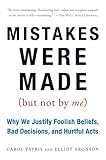 Mistakes Were Made (but not by me): Why We Justify Foolish Beliefs, Bad Decisions, and Hurtful Acts by Carol Tavris and Elliot Aronson
Mistakes Were Made (but not by me): Why We Justify Foolish Beliefs, Bad Decisions, and Hurtful Acts by Carol Tavris and Elliot Aronsonrating: 5 of 5 stars
This was the best book I have read in the last few years. Highly recommended. It was so informative and engaging that I think I wore out my welcome reading it out loud to anyone who was nearby.
Written by two social psychologists and based on years of research, it provides a fascinating overview of cognitive dissonance, and how it applies to prejudice, memory, law, marriage, and war. The most chilling point is how we are all subject to dealing with dissonance (usually in self-justifying ways), what we think we know or remember is probably not the case (regardless of which side we're on), and most of our leaders and public figures shirk responsibility for their mistakes.
A few highlights:
Written by two social psychologists and based on years of research, it provides a fascinating overview of cognitive dissonance, and how it applies to prejudice, memory, law, marriage, and war. The most chilling point is how we are all subject to dealing with dissonance (usually in self-justifying ways), what we think we know or remember is probably not the case (regardless of which side we're on), and most of our leaders and public figures shirk responsibility for their mistakes.
A few highlights:
- Reasoning areas of the brain "virtually shut down" when we are confronted with dissonant information, and emotion circuits light up when consonance is restored. Basically, this shows that there is a neurological basis for the fact that once we make up our minds, it is pretty hard to change them.
- Naïve realism - the "inescapable conviction" that we all have, that we see things as they really are. If someone has a different opinion they obviously aren't seeing things clearly.
- Being "absolutely, positively sure" a memory is correct does not mean it is. We can have vivid false memories full of emotion and detail. People can recover memories of abuse, which is shown to be dubious, and even experience alien abduction without it actually happening. Basically, we can have experiences that we think are real, especially in the past... yet they never happened. Without some outside confirming source, we cannot trust our memories too much.
- Parent blaming - a convenient form of self-justification; it allows people to live with regrets or mistakes because all the mistakes were made "by them."
- Both Bill Clinton and George W. Bush have been guilty of self-justification and failure to admit their mistakes. The last president to clearly admit to a major mistake was John F. Kennedy. The two presidents to use the phrase "mistakes were made" the most were Richard Nixon (of course) and Ronald Reagan. What is so insidious about the phrase (which Clinton even joked about using so much) is that it is a complete avoidance of responsibility.
- Finally, resolving dissonance is not completely bad, and does serve to preserve our beliefs, confidence, and self-esteem. However, it also gets us into trouble. Hence, the authors suggest that it is possible to remain committed to a religion, political party, or partner, yet understand that "it is not disloyal to disagree with actions or policies" that one believes is inappropriate, misguided, or immoral.
Read this book! It is not very long, is very engaging, and you will learn a LOT about yourself and society.
There is also an NPR podcast on this book and cognitive dissonance: Why It's Hard to Admit Being Wrong.


This may be irrelevant but I think it's interesting. Did you know there is no word in the Spanish language for "drop". You can't drop anything. The way they say this is, "it fell from me". How convenient that there is no way for a Spanish speaking person to except blame for dropping something. It's all how you spin it. "Mistakes were made"...
ReplyDeleteYou've got me interested in reading this book. I think my daughter would read it too.
Lol, that is funny... I kind of felt that way with japanese, i.e. occasionally when a someone spoke English they would always be way more direct.
ReplyDeleteLet me know what you think if you read it. It's worth the short time it takes!
Yeah, there is that about Japanese. Sounds like an excellent book.
ReplyDeletethat comment was awesome. i hate to say it, but i should totally say that. seriously, what to do, what to do?
ReplyDeleteGreat quote from the AIG CEO today:
ReplyDelete"Mistakes were made at AIG on a scale few could have every imagined possible."
Are we still using this phrase? Really?